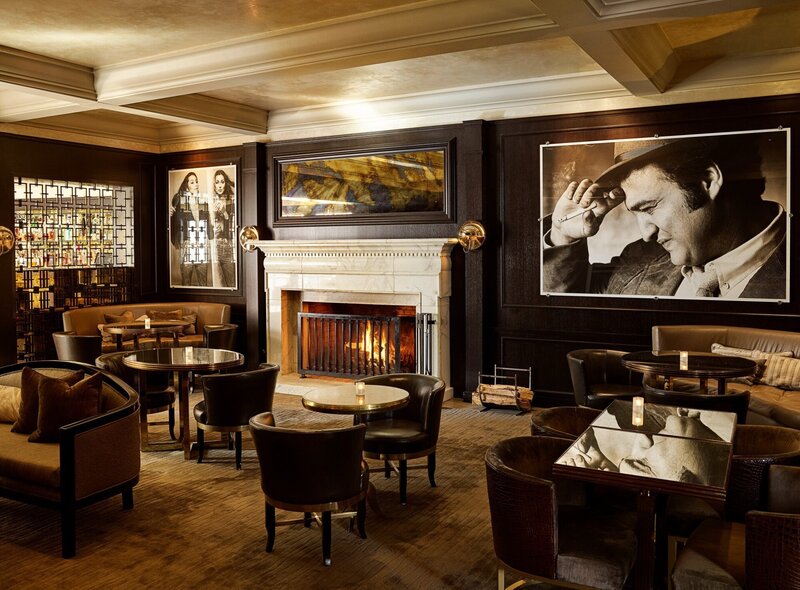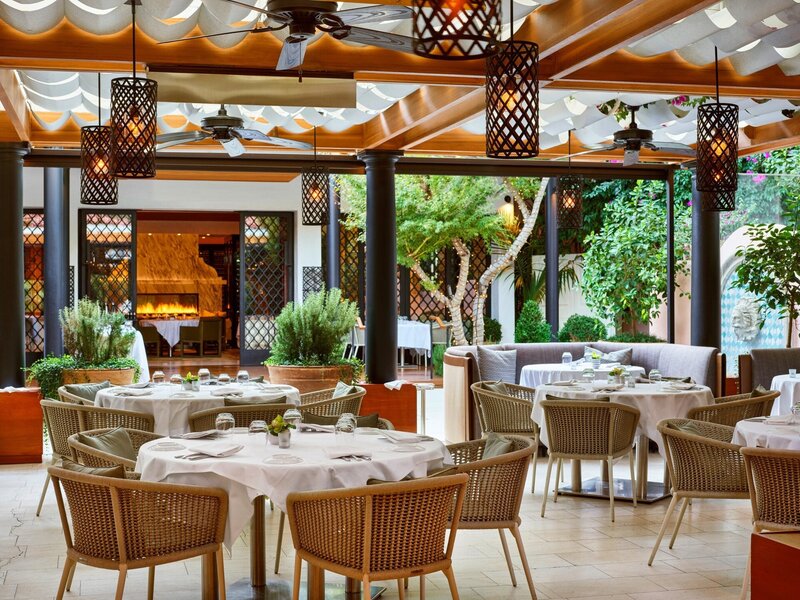Becoming Best: Setting a New Standard of Hospitality at Hotel Bel-Air

Bianca Esmond
8 min read
Jun 23, 2025


Bianca Esmond
8 min read
Jun 23, 2025

Becoming Best is a new series from SevenRooms, spotlighting the people, practices and philosophies powering the world’s most exceptional hospitality experiences. As the official booking platform partner of The World’s 50 Best Hotels, SevenRooms is proud to celebrate the operators redefining what it means to deliver personalized service, meaningful connection and guest loyalty at the highest level.
In this edition, we speak with Micah Paloff, Director of Food & Beverage at Hotel Bel-Air, about how emotional intelligence, thoughtful details and a deep respect for tradition shape hospitality that stands the test of time.
I came up in the old way of hospitality. It's something that comes very naturally to me, and it’s hard to teach. I’m a host, a social butterfly – like the old school maitre’d’s from back in the day.
Growing up, I’d go to the dark Italian restaurant with red leather booths and white and red checkered tablecloths. You’d have the maitre’d come over and check on you. Asking: How is everything? How is it? Can I get you anything? I learned from these interactions that for me, hospitality is the same thing as welcoming you into my home. The people that are best at hospitality – the French, Japanese and old school Americans – it’s because they treat you as if you’re in their home.
I want to make sure your drink is full, that you have something hot to eat, and that you’re talking to the right people. I want to make introductions if I’m talking to someone across the room, and they say something where I think they’ll get along with another person sitting nearby. Over the last two years, as we’ve returned to a new normal after COVID, hospitality has become the key differentiator. No longer having to say ‘no’ but instead welcoming people into my home when they come into my hotel.
We are part of Dorchester Collection, and we have 10 hotels worldwide. One of the things we say is ‘treasured by guests’, and that only gets realized by creating those memories for guests. We have guests who have been coming for 30, 40 years, and we have the younger guests who come in and say, “I used to come here with my grandma.”
What makes this hotel so special is that you drive up this canyon in Los Angeles, and you think you’re going the wrong way. Then you get here and you realize this is where you’re supposed to be. You park your car, walk across a bridge, and to your right you see a lake with swans swimming on it and so much lush greenery. And that’s all before you even step inside for a drink, meal or stay. What makes us different is that our guests are some of the most well-traveled guests in the world. They vacation with their families in places that I'm never going to see. They experience the best that life has to offer, but when we personalize our service and make them feel valued and cared for, that's what really makes the difference.

As I said, there is a connection already that some guests have with the hotel, whether it was visiting here with a relative when they were younger, or they had a business meeting here and did the handshake deal that made their career. There’s a connection to those memories.
But the world has moved fast, and we have to stay relevant. In the ever-changing market of Los Angeles, it’s constantly evolving and getting more competitive. So, how do we stay relevant? We have people come in who have a connection to it or who are drawn to the hotel for its history, but there is also a younger generation who may have never been here before. That’s why we’ve done thoughtful refreshes.
Our Living Room is brand new, a full-service food and beverage outlet with tableside martinis. We also have the Pâtisserie, helmed by our very talented pastry team, which utilizes an existing space that wasn’t being used. We’re doing a refresh of our restaurant to make it brighter, bringing in more colors and decor to highlight the beauty of our bougainvillea trees.

We’ve always stayed ahead of the game with integrating technology into our guest experience. When we reopened in 2011 after a $100 million renovation, we became the first hotel in LA to offer iPads in every room, letting guests order anything they needed straight from the device. We’re always trying to use the best that can help make the guest experience easier.
Check-in is a great example. Instead of the traditional check-in, coming in with your bags, walking up to the front desk, signing the registration card — now, technology has allowed us to make this process as seamless as possible for our guests. When you pull up, the valet says, “Are you checking in?” and if you say yes and give your name, we’re already calling ahead so someone can meet you with your keys in hand and walk you right to your room. It’s something we’re ahead on that sets us apart, and other hotels will follow.
Our restaurant is a celebration restaurant. People come here for birthdays and anniversaries, baby showers and graduations – there’s always some kind of special occasion. We try to do a little bit of research on our guests and, for example, have framed photos of them waiting at the table when they arrive. It’s a detail that leaves a lasting impression. Guests always ask to take the photos with them, and they will always remember it.
This is LA, and it’s the entertainment capital of the world. We deal with every rockstar, movie star, superstar and athlete. But if you’re just Mr. Smith coming here for the first time, you’re going to be treated the same. We’ll call you by your name, make you feel like you’re special. We treat every guest like they’re the most important person in the room, whether they’re famous or not.

And we do it every day. We’ve moved so far, in hospitality, from the free desserts – everybody does that, and we don’t do that. We personalize on a deeper level. If someone has kids, we always try to give them a gift, like a stuffed swan. If they’re interested in the food at our hotel, I give them a tour of the kitchen while it’s in service. I also like to show people our Presidential Suite. It’s the largest Presidential Suite per square foot in Los Angeles, and so if I know it’s vacant, I’ll give guests a tour of the room, and they’re just wowed by it. These touches build connection and really resonate with our guests.
We use [Nexus and SevenRooms] to track these interactions, if it has to do with dining or if they’ve stayed here or at our other hotels. For example, you stay here and we find out that you like white burgundy wine and drank this specific one. We note that so our colleagues overseas know this guest already – that they drink white burgundy and like talking to the sommelier. That level of detail helps us deliver consistently personal service.
I worked for Dorchester Collection, left for another opportunity and then I came back to Dorchester Collection. A lot of my regulars often ask me, “Why did you come back?”. There’s not a company I’ve ever heard of that takes care of their employees the way that Dorchester Collection does. When I went to work elsewhere, I always compared things to Hotel Bel-Air. One of the things that resonated with me was when I was thinking about coming back to this company during COVID. During the pandemic, when most hotels were laying people off, they didn’t lay a single person off.
They called everyone while they were sitting at home and said: “I don’t know when you’re going to be able to come back to work or we’re going to be able to reopen this hotel, but we’re going to pay you and your job is waiting for you when you’re ready to come back.” That made my decision to come back here a second time.
This care translates down to every line employee. They know that they’re appreciated and that this company cares for them. And that translates into the service. They want to do a good job, even if hospitality isn’t a lifelong career for them. They take it seriously to care about the guests, because they know the company cares about them.
Like I said, I think that people tend to set the bar, and then you’ll see everyone else five to ten years later come behind. So we try to be our best at setting the bar. As for the industry, hyper-personalization of service is huge, especially for luxury. It’s what people are going to come to expect.
I pride myself on trying to do the most activations throughout the property in food and beverage that have ever been done before, because there’s an exclusivity element that people want to feel when they step onto our property. Whether it’s a Japanese whiskey tasting, a caviar event, a chef’s collaboration or our yearly barbeque, we’re curating super-exclusive experiences you can’t get anywhere else.
“We’ve moved so far, in hospitality, from the free desserts – everybody does that, and we don’t do that. We personalize on a deeper level.”
These types of experiences are something that more and more hotels are going to do, because the discerning, well-traveled guests of today expect experiences they can’t get anywhere else.
Something I try to communicate most to my team is that it’s not just about knowing the big names. Sure, everybody knows who Taylor Swift is – she might be one of the biggest music stars in the world – but do you know who her manager is? Because he’s coming in for lunch, and he wants that same kind of recognition. And then you have the guest behind him – Mr. Smith or Mr. Jones – and you have to give them that same energy. No one should feel less important. That’s where I think hospitality is evolving to.
Even something as simple as “Welcome back” – it’s such a big thing. I say it to everyone if I’ve seen them before. But I’ll tell you a funny story – one time, I said, “Welcome back!” and the guest replied, “Oh, I’ve never been here before.” And I said, “Oh, I’m so sorry, I must’ve confused you with someone else – but it’s really nice to have you here.”
That’s the only time that’s ever happened. But even then, he felt greeted in a way that made him feel important. Those little things – that recognition – they really matter.
Like I said in the beginning, I think just about being an exceptional host. If I were to leave a legacy, it would be centered around giving an exceptional guest experience while still maintaining a deep connection to history and tradition.
I understand that nostalgia plays a huge role for many of our guests. If someone has only been here five times in their life, or maybe even just twice, but both times were with their grandmother who’s no longer with them, that’s incredibly powerful. Moments like that carry a lot of meaning.
Honoring and treasuring those memories, while continuing to deliver a personalized, meaningful experience in the present – that’s the legacy I hope to leave. And that’s the direction I hope the hospitality industry continues to move toward.
Interview has been edited for clarity and length. Images courtesy of Dorchester Collection.